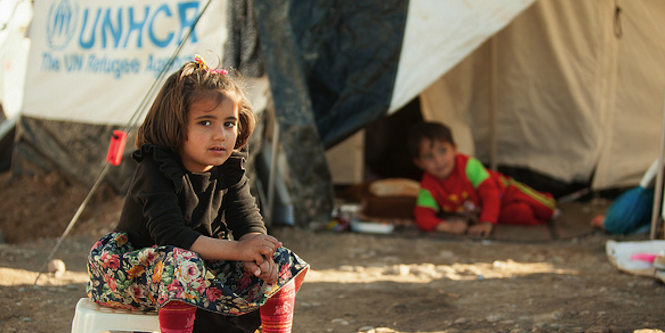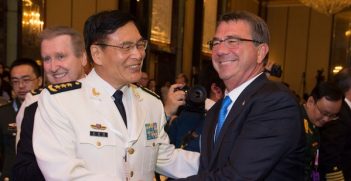The Refugee Crisis: Sharing the Burden

The world is currently witnessing the biggest refugee crisis since World War II, marked by huge shifts when it comes to who and how refugees – and migrants alongside them – are moving.
Today’s figures are dramatic. They include a global displacement figure of around 60 million people, and more than 160 refugee host countries. Moreover, it is predicted that by the end of 2016 there will be 4.7 million refugees from Syria alone. Some 13.5 million Syrians will be internally displaced and in desperate need of international aid, with the United Nations appealing for over $7 billion to assist them. Globalisation has opened up enormous new possibilities for those having to flee or choosing to move. In the first six weeks of 2016, more than 80,000 refugees and migrants arrived in Europe by boat, with more than 400 deaths. Many thousands continue to amass at the continent’s external borders seeking to cross. The big growth in transnational crime and people smuggling has much facilitated this and so too has technology.
Former UN Secretary General Kofi Annan spoke about “problems without passports”. Indeed, borders have become exceptionally porous, with technology playing a major disruptive role. Migrant flows have been rising, ebbing and changing course rapidly as new routes through the barriers being set up to contain them have been tweeted or googled with remarkable success.
Crises of this sort tend to drive significant and long-lasting changes in the way states respond to refugee events, in accordance with their regime of rights and responsibilities. An important recent analysis of the link between major crisis situations and normative regime change is Phil Orchard’s recent book, A Right To Flee: Refugees, States, and the Construction of International Cooperation. The argument goes that these crises eventually serve to delegitimise the existing protection regime of the time, causing states to lose confidence in it and provoking an active search for more effective alternatives. This in turn opens up possibilities for “norm entrepreneurs”, notably UNHCR, to develop and promote new normative understandings. These often (but not always) help to shape alternatives in more positive terms.
Of course it is not only situations in the developed world that are game-changers. Very significant contributions to normative change have come out of Africa and Latin America, as a result not least of decolonisation and conflicts linked thereto. These events have significantly altered the way refugees are now defined and the responsibilities that flow. African countries were the first to enshrine in regional and national law the broader definition of refugees, to include not only victims of persecution but also of widespread violence, war and civil strife. This in turn is very much underpinned to the activities of UNHCR on behalf of a much larger group of beneficiaries than what was originally envisaged in its mandate. It also contributed to a broadening of the working definition in Latin America and underpinned the development of alternative protection statuses in Europe and elsewhere in the developed world. The African Convention on Internal Displacement may well prove a similar legal game-changer when it comes to protection of internally displaced persons.
Not to be underestimated either are other drivers of change. In this connection, important incremental contributions to normative development are certainly being made through efforts to develop a Common European Asylum System, which are spurring important changes in basic refugee protection notions, not least the refugee definition. The role played in this regard by EU and Council of Europe human rights mechanisms, notably the European Human Rights Convention and accompanying jurisprudence of regional courts, should also be credited. So too must developments within the UN system itself, pursuant to its Transitional Agenda for Change. This is in part driven by governments pushing for a more coordinated and cooperative UN system, an agenda which is also fuelled by the fallout of human rights failures by UN agencies in the Sri Lanka conflict. This has impacted on the mandates of organisations like UNHCR and more generally changing the basis and framework for humanitarian work in significant ways.
This confluence of circumstances – a displacement crisis of huge proportions and other agents of change active and progressing their agendas – may well be the spur for a new regime change. These are developments which call as never before for a coordinated and cooperative international approach.
The most under-developed of the concepts underpinning the prevailing refugee protection norms is that of international solidarity and burden- and responsibility-sharing. Despite its central place in the current regime, there is no clear articulation of its content or guidelines for its practice. The current situation might well prove to be a crisis of such proportion that it will now drive regime change, bringing burden-sharing to the foreground and giving tangible meaning to the norm of international solidarity for refugee protection.
Erika Feller FAIIA is the former UNHCR Assistant High Commissioner for Protection. She is currently a Vice-Chancellor’s Fellow at the University of Melbourne. This article is published under a Creative Commons Licence. It may be republished with permission.





